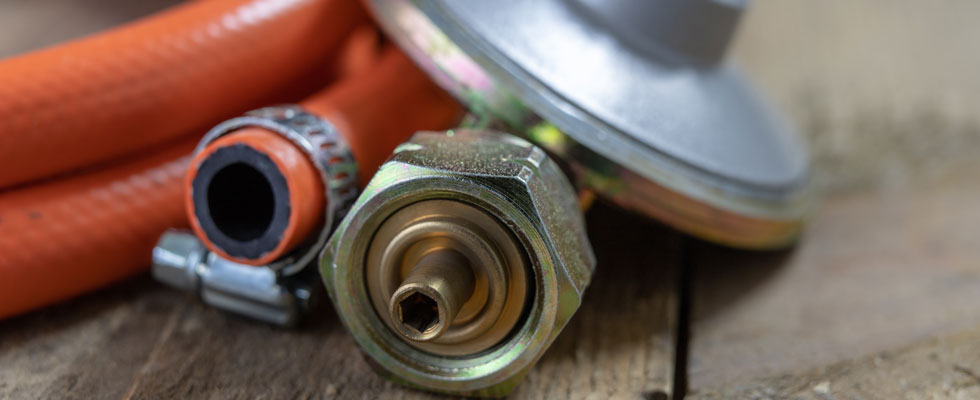
In January, the Louisiana Court of Appeals affirmed the dismissal of a propane explosion lawsuit against a propane retailer. The suit arose from high delivery pressure that was caused by an improper pressure setting on a regulator.
Boiling Crawfish
In January 2011, Lacox Propane set a 250-gallon propane tank and commenced service at Superking Seafood in Hammond, Louisiana. Superking used propane to fuel multiple commercial appliances, including boilers for preparing crawfish. The installation was checked by the Lacox technician for potential hazards and approved by the Louisiana Liquefied Petroleum Gas Commission. The tank was equipped with a pressure regulator that reduced tank pressure to five pounds per square inch (psi), which was the approved level of pressure for the commercial appliances at Superking.
In March 2011, the Lacox service technician returned, at Superking’s request, to switch the 250-gallon tank for a larger, 500-gallon tank. Once the new tank was in place, the technician checked the installation for leaks by increasing pressure to the system to 10 psi. He again checked the system for potential hazards. Finding no potential hazards, he reduced the system pressure to five psi and left.
Fire in the Boiling Room
Over the next five years, Lacox made multiple propane deliveries to the 500-gallon tank. However, there were no additional service calls, and it does not appear that the tank ever ran out of gas. The last deliveries to Superking before the incident were made on April 3, 2016, and April 7, 2016.
On April 10, 2016, a fire occurred at Superking and spread to Lee’s Drive-In, an adjacent restaurant. Both buildings were severely damaged. Investigation revealed that the fire originated in Superking’s boiling room, where Superking was using multiple burners to boil crawfish. After the fire, the propane tank regulator showed a setting at 18 psi, 13 pounds over the allowable five psi limit. It was later alleged that the fire was the result of the delivery of high-pressure propane to the crawfish boilers, causing them to overheat and cause a combustible wall to ignite. It was also later alleged that the boilers were not intended for indoor use and were placed too close to the combustible wall.
Lacox denied ever changing the regulator setting from the 5 psi level that it was set at in 2011 and denied any knowledge that the setting had been changed. It also denied any knowledge of a hazardous condition or improper installation of the crawfish boilers.
A Question of Duty
The owners of Superking and Lee’s Drive-In (and their respective insurance carriers) sued Lacox Propane, which responded with a motion for summary judgment based on its lack of knowledge of the improper regulator setting. The trial court granted the Lacox motion, and the plaintiffs appealed. The appellate court began by reviewing the duties of a propane distributor under Louisiana law, focusing on the distributor’s obligation to act if it has knowledge of a hazard in the customer’s gas system:
“The Liquefied Petroleum Gas Commission makes and enforces rules and regulations governing the installation of liquefied petroleum gas tanks or systems and the installation and use of liquefied pewtroleum gas appliances. The Commission rules provide that a dealer shall not serve any liquefied petroleum gas system that the dealer knows is improperly installed or in a dangerous condition. All improper systems shall be corrected before the dealer services such system with fuel for the first time. However, a servicing dealer shall not be responsible for unauthorized changes in or failures of an existing system or connected appliances that have been tested, checked, and found in compliance with Commission’s rules and regulations. In an action for damages against a liquefied petroleum gas supplier, it shall be an affirmative defense that the damage was caused by the alteration, modification, or repair of liquefied petroleum gas equipment/appliances, if the alteration, modification, or repair was done without the supplier’s knowledge.”
The Testimony
The court then reviewed the evidence against this standard. It started with the service technician who installed both propane tanks. He stated that in January 2011 he set the regulator to deliver 5 psi and that after installing the larger tank in March 2011 and checking for leaks, he again set the regulator to deliver 5 psi. He never returned to Superking nor had any knowledge that the regulator was ever set at a higher level. The regular delivery driver for the Superking account said that his duties included checking the percentage gauge on the tank to determine how much propane to add. He added that his duties did not include checking the pressure delivered by the regulator located near the percentage gauge. He added that he did not know the appropriate pressure setting for a propane tank regulator. He also testified that he did not enter the Superking boiling room when refilling the propane tanks. Superking, he testified, never alerted him to any problem with its propane system, and he did not see any unsafe practices or situations while there.
Possible Mistake
Lacox supervisors testified that a propane tank regulator, such as that at Superking, be set no higher than five psi. They denied knowing how the subject regulator got to 18 psi and stated that a Lacox employee would not have set the regulator at 18 psi.
They confirmed that Lacox route salesmen were not required to check regulator pressure. They confirmed that Lacox did not recheck the regulator pressure after the initial installations in 2011, and Lacox had no record of Superking requesting a pressure check at any time after that. They stated that, upon initial installation of the propane tanks, the technician would have checked Superking’s setup to make sure everything was in “good working order, the right valves and hoses, and in a safe place,” but Lacox wouldn’t have again checked Superking’s setup unless notified of a change. However, when asked if the technician could have forgotten to lower the pressure back to five psi after checking for leaks in March 2011, one of the supervisors stated that it was “a possibility that anybody could make a mistake.”
The court stated that the service technician’s testimony that he set the regulator at 5 psi was unrebutted by the plaintiffs. Just because a supervisor admitted that “anybody could make a mistake,” the court reasoned, “does not reasonably infer that the technician set the pressure at 18 psi, not at 10 psi, and then forgot to lower the pressure from 18 psi to 5 psi.” It concluded that it is mere speculation to argue that the technician improperly set the regulator in 2011.
Constructive Knowledge
The court also rejected plaintiffs’ argument that Lacox had “constructive knowledge” of the improper use of outdoor burners inside the Superking boiling room, or the fact that the burners were too close to a combustible wall. The service technician, it stated, “testified that he did check Superking’s entire set up in 2011 and, on the two occasions he was there, he remembered nothing that he would have considered a potential safety hazard.”
The court found no evidence to rebut this testimony. Further, the Lacox delivery driver testified that he did not enter the boiling room when he refilled the propane tank at Superking. The court found that “the fact that he frequently refilled the exterior tanks over several years is not evidence that he knew Superking’s boiling room setup was unsafe.”
The plaintiffs argued that the delivery driver had a duty to discover that the pressure regulator was not properly set, given that it was so close to the percentage fill gauge. The court rejected this claim for two reasons.
First, the plaintiffs “have pointed to no source imposing such a duty.” Second, “there is no evidence of when the regulator’s pressure was changed to 18 psi,” so the setting could have been changed by some unknown person after the last delivery.
Finally, the court rejected the last argument raised by the plaintiffs — that Lacox had a duty to somehow lock the regulator so that its setting could not be changed. Having rejected all of the plaintiffs’ arguments, the appellate court affirmed the dismissal of all claims against Lacox Propane.


